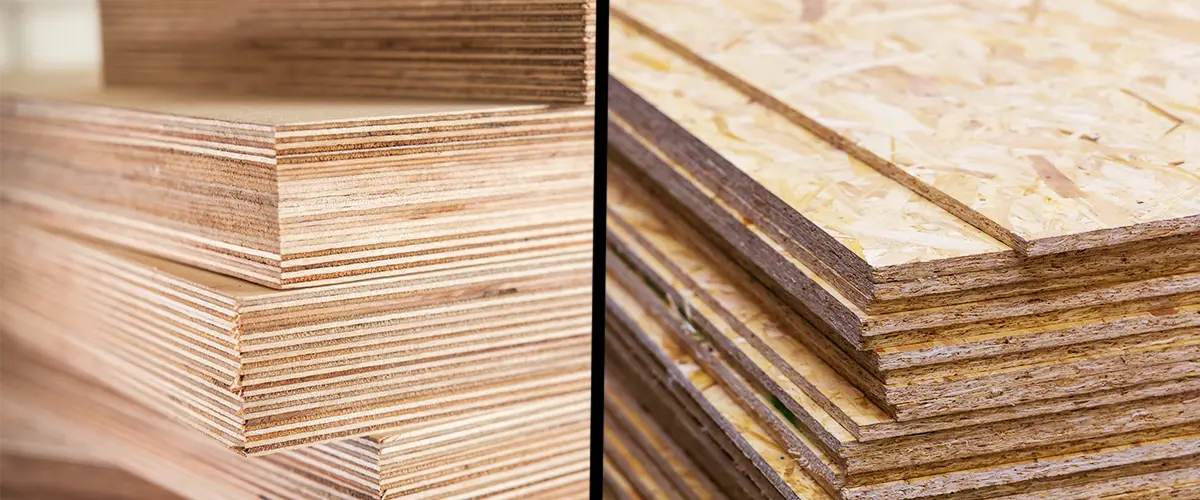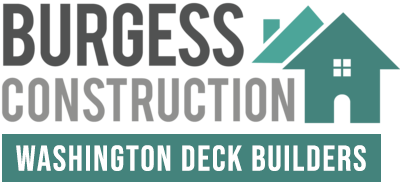Deck roofing choices can often leave homeowners scratching their heads. Did you know that Oriented Strand Board (OSB) and Plywood are two of the most popular materials used for this purpose?
In this blog, we’ll compare these options in terms of durability, cost-effectiveness, and installation process to help simplify your decision-making.
Intrigued? Let’s explore which is better suited for your deck roof!

Comparing OSB vs Plywood for Deck Roofing
- Strength and durability
Plywood offers superior strength and resistance to most weather elements. It can resist high winds, heavy rains, and even scorching temperatures while maintaining its quality shape for a long time.
Oriented Strand Board (OSB), on the other hand, is known for its exceptional durability and ability to hold screws or nails better than plywood. Its structure allows it to distribute loads evenly throughout the panel’s surface area, reducing the risk of damage from heavy materials or foot traffic on your deck roofing.
Both options provide solid sturdiness, but since you’ll want them for your deck’s roof, we’d recommend plywood because it’s more resistant to the weather elements.
- Cost-effectiveness
Opting for OSB (Oriented Strand Board) can be pocket-friendly. It is generally less expensive than plywood, making it a more cost-effective option for homeowners on a budget. Whether you’re looking to install composite decking or wood decking, this low maintenance roof material saves money without compromising quality.
However plywood’s durability reduces costs associated with damage over time and makes it an attractive choice for those willing to invest a little extra initially for potential savings later on.
- Usage and installation
Both OSB and plywood have straightforward installation processes. For OSB, you only need standard fasteners and a power saw to cut it to size. Installation of plywood requires the same tools but comes with an added demand for precision as poorly installed sheets could lead to structural integrity issues over time.
Neither material provides a low maintenance roof or deck without proper sealing and regular inspections, though. Whether you choose composite decking or traditional wood decking also impacts installation methods slightly due to differing expansion rates between materials.
Pros and Cons of OSB vs Plywood for Deck Roofing
| OSB | Plywood | |
|---|---|---|
| Pros | OSB is generally cheaper than plywood. It offers stable dimensions and less susceptibility to weather changes. It's easier to install due to larger size panels. |
It has a higher strength-to-weight ratio, ideal for demanding outdoor conditions. It's less likely to off-gas volatile organic compounds (VOCs). Plywood withstands delamination, making it durable over time. |
| Cons | OSB can swell and delaminate when exposed to water. It has a higher tendency to off-gas VOCs. OSB is potentially more susceptible to mold and termites. |
Plywood is generally more expensive than OSB. Its sizes are usually smaller, which can increase installation time and cost. Plywood can warp if not properly installed and maintained. |
Check here to find out more valuable information about the 5 most common errors when building a deck you want to avoid when building new decks.
Now that you are aware of the pros and cons of both OSB vs plywood for deck roofing, you can make an informed decision based on your budget, durability needs, and personal preferences.
Which is the Better Choice for Deck Roofing: OSB or Plywood?
Cedar Wood Fences
- In terms of strength and durability, OSB tends to be more susceptible to water damage compared to plywood. Plywood has a higher resistance to moisture, making it a better option for outdoor use.
- When it comes to cost-effectiveness, OSB typically has a slight edge over plywood. It tends to be cheaper due to its manufacturing process using smaller wood strands instead of whole sheets of veneer like in plywood.
- In terms of usage and installation, both OSB and plywood are easy to work with. They can be cut into various shapes and sizes without much difficulty. However, OSB may require additional sealing or waterproofing measures before installation due to its susceptibility to moisture damage.
Conclusion
Here at Burgess Construction, we’ve been building decks for a lifetime and we’ve used dozens of products as roofing for decks, from asphalt shingles to metal ones.
Out of these two options, we’d recommend our homeowners plywood covered with asphalt shingles for added beauty and efficiency.
If you’re curious to learn more about what the best roofing materials for your deck would be, request a quote from us or call us directly at (425) 791-5281 tot discuss your upcoming project.
